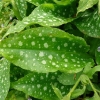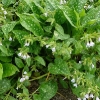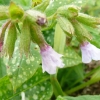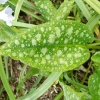Features
Flower buds are lavender-pink coloured, opening into pale sky-blue, funnel shaped flowers. Mid green leaves have the typical white spotting.
What to use it for
Useful as deciduous ground cover in beds and borders (particularly for edging borders) and underplanting shrubs (including roses). A good choice for wildlife gardens as the flowers attract bees.
How to look after it
This plant requires minimal pruning, really just to keep it neat and tidy. If it’s in dry conditions then some watering may be required in the summer to prevent powdery mildew taking hold. To maintain vigour, the plant should be divided every three to five years.
How to prune it
Cut back the leaves once flowering is over to encourage new leaf growth later in the season. Cut back in autumn if you wish, to remove tatty old leaves.
How to propagate it
Divide in spring after flowering; the plant will benefit from this being done every three to five years.
Collect seeds in late spring and sow at 10°C. As this is a cultivar it may not come true to type.
Root cuttings can be taken in the winter.
Common problems
While generally pest free, this Pulmonaria can be susceptible to powdery mildews in dry conditions. If you do get a case of powdery mildew, remove all affected leaves and destroy (not on your garden compost). The plant should regrow fresh leaves (unless it’s at the end of the season already).
Other useful information ?
The name ‘Pulmonaria‘ derives fro the Latin ‘pulmo’, meaning lung, due to the plants being used as a treatment for bronchial diseases – hence the common name ‘lungwort’. This view of the medicinal properties of Pulmonaria was derived from the fact that the leaves were said to resemble diseased lungs. It is still used for medicinal purposes, although there are legal restrictions on this in some countries.
The young leaves of Pulmonaria can be used in salads and soups. Extracts are also used in the production of vermouth.
Pulmonaria can be a skin irritant and allergen.









